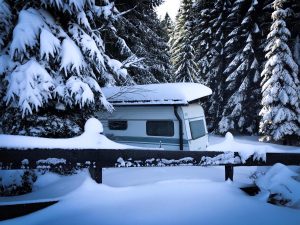Owning a caravan can be fantastic. It offers you the chance to travel in comfort and style, bringing all of the necessary home commodities on the road with you. However, conducting proper caravan maintenance is paramount, especially in the winter months.
While you aren’t likely to be making much use of your caravan over winter, the last thing you should do is forget about it. Caravan maintenance becomes even more important in winter. Let’s find out more.
Why is Caravan Maintenance So Crucial?
Caravans are expensive vehicles. Not only that, but they also often house expensive items and valuables, such as kitchen appliances. Failing to properly maintain your caravan could see it become damaged, or the items within it degraded. In addition, improper maintenance could leave your caravan vulnerable to theft.
If your caravan is covered by a static caravan insurance policy, failing to properly maintain your vehicle could invalidate your claim in the event of an emergency. If the incident is deemed to have been preventable, your insurance provider could realistically withhold your settlement, leaving you in a sticky situation.
Below, we’ve written up a short caravan maintenance guide to help you protect your vehicle over winter.
Clean Your Caravan
The first step in winter caravan maintenance is to clean the vehicle thoroughly, inside and out. Start with the exterior and remove all dirt and grime from the bodywork, as this can damage the paintwork if left for a long period of time.
Next, clean the interior of your vehicle. Remove all rubbish and food debris, as this can cause mould to grow which can cause damage and pose a health risk.
Inspect for Signs of Wear and Tear
Before storing your caravan for the winter, you should inspect it in detail and look out for signs of wear and tear. Pay particular attention to the exterior of the vehicle, especially the tyres and windows.
Check the treads on the tyres and ensure they are of an adequate depth. You should also chock your wheels with heavy objects, like bricks, placed on either side. This means you can leave your handbrake off during storage and reduce the stress on the brakes (provided the caravan is parked on a flat surface).
When checking your windows, make sure they are fully closed and that all rubber seals are in good condition. This will prevent moisture from getting in and damaging the interior of your vehicle.
Drain Water
Leaving water in your caravan’s system over winter is to be avoided at all costs. If you do so, the water could freeze and damage the pipes, leading to an escape of water further down the line.
As part of your winter caravan maintenance process, drain all the water from your vehicle’s system and ensure all pipes are cleaned and disinfected. You can do this by flushing the system with a water-cleaner solution and then turning off the water supply and opening all taps to drain the pipes.
You should leave these taps open over the winter, as this will prevent moisture from building up.
Secure Your Caravan
Finally, you should always take steps to ensure your caravan is properly secured while in winter storage. According to statistics published by the Scottish Government, theft of and from motor vehicles has increased over the past year. This is why securing your caravan is so vital.
What’s more, your insurance provider might stipulate that you take steps to secure your vehicle. Read over your policy in detail to check if there are any specific requirements.
Wheel locks can be an excellent choice. Not only will these prevent your caravan from moving, but they will also act as an effective deterrent that will discourage thieves from targeting your vehicle in the first place.
Conclusion
Keeping up to date with your caravan maintenance this winter is of the utmost importance. Not only will it keep your vehicle looking its sparkling best and functioning correctly, but it will also ensure you are not in breach of your insurance agreement should an unforeseen emergency transpire.


